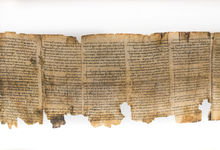Ministry (3): A matter of authority
What exactly is a ministry permitted to do? Anything that is part of its authority: where do these powers come from, and what purpose do they serve? The answers to these questions constitute the focus of part three in this series on the New Apostolic concept of ministry.

Exousia, exousia, exousia … Whenever Jesus teaches, He does it with exousia. Whenever He forgives sins, it is on the very same basis: exousia. His opponents specifically ask Him about it all the time. And in the end, Christ says that He has received all the exousia there is in heaven and on earth.
Exousia is the Greek word for “power of rule” or “authority”: an entitlement, a right of disposal, an official power. It is something that can be awarded or transferred to someone. This stands in contrast to the different kind of might or power that is known as dynamis in Greek, which refers to an innate or acquired power or ability.
Jesus’ powers as an envoy
When Jesus speaks and acts in authority, this means that He does not do so in the power of His own ability, but primarily on the basis of the authority that has been conferred upon Him. Even the man Jesus Christ is an envoy, as He Himself often emphasises, and He works by the authority of His Father in heaven.
What are the powers at His disposal? Early Christendom already found the answer to this question in what is known as the threefold ministry of Christ, which is comprised of King, Priest, and Prophet.
- King. This is the one who rules His kingdom, which is not of this world, however. The kingship of Jesus comes up again and again in Scriptures, starting with the wise men at the manger and concluding with the “INRI” sign [Iesus Nazarenus, Rex Iudaeorum, “Jesus of Nazareth King of the Jews”] posted on His cross.
- Priest. This is the one who imparts salvation and creates reconciliation with God: Jesus not only does this by forgiving sins, but above all, by way of His sacrificial death, which makes Him the eternal High Priest of the new covenant.
- Prophet. This is the one who proclaims the will of God and prepares the way for the future. And it is precisely this that describes His activity on earth. The words, “Thus says the Lord” from the old covenant become, “But I say to you …” in the new covenant.
Jesus’ authorisation as Sender
In the gospels of Mark and Luke, the term chosen when Jesus issues powers to the twelve disciples—whom He also calls “Apostles”— is likewise exousia. The same holds true when the book of Acts describes the authority to dispense the gift of the Holy Spirit.
Therefore authority does not remain confined to Christ in the New Testament. Rather, He—as the Sender—now imparts it to His envoys or ambassadors, who share in His ministerial powers of King, Priest, and Prophet. He gives the Apostles the authority to teach, to baptise, and to celebrate Holy Communion. Beyond that, He authorises them to forgive sins in His name.
The powers of the Apostle ministry
According to the New Apostolic understanding it is clear that Jesus Himself established the Apostle ministry and authorised it to
- dispense all the sacraments (that is, to impart salvation from God), and to
- preach the gospel in the proper manner (that is, to proclaim the will of God).
The Kingship of Christ is reflected in His commission to the Apostles to lead the church and to organise congregational life. These powers were likewise issued to the Apostles by Jesus Himself—and we see this twice in the gospel of Matthew namely,
- with the authorisation to bind and to lose: that is, to declare something as binding or not binding, or forbidden or allowed—which is given to the apostolate as a whole.
- with the authority of the keys He gave to Peter, which entails developing new insights through the proper interpretation of the teaching of Jesus.
So much for the theological foundations: the ministry is founded on the word and deed of Jesus, corresponds to His dual nature, and can only act on the basis of His authority. But what does this mean in practice for the ministerial order? The next issue of this series looks for answers to this question in the testimony of the New Testament.
(Sources for this article series include the Catechism of the New Apostolic Church, a supplementary “Commentary on Chapter 7”, Divine Service Guide Special Editions 03/2017, 04/2017, and 02/2019, as well as the training documentation for the launch events / photo: rupbilder - stock.adobe.com)



















